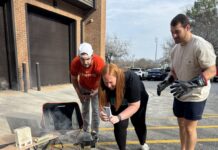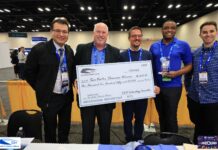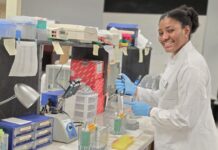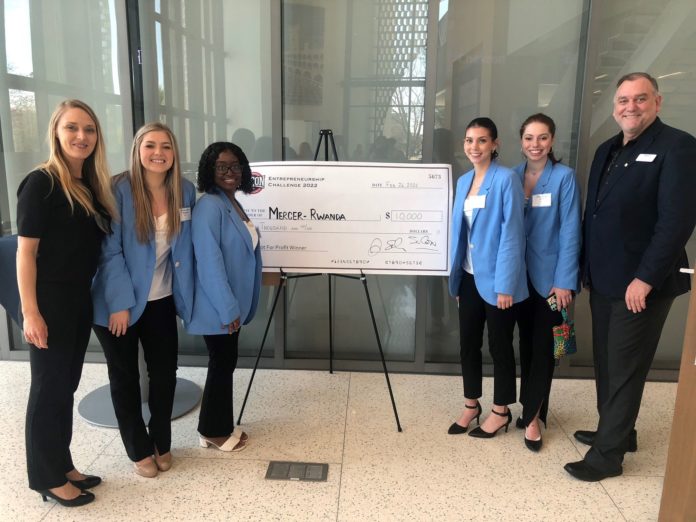
A group of Mercer University students recently won first place and $10,000 in the nonprofit category of the inaugural Southern Conference Entrepreneurship Challenge. Mercer was among nine colleges that competed in the event at the Tommy and Victoria Baker School of Business at The Citadel on Feb. 25-26.
Senior Olivia Korta, juniors Emma Drash and Aaryanna Mercer, and sophomore Martha Corinn Thompson clinched the win with their 10-minute presentation on the Agaciro project, which was inspired by the Mercer On Mission program in Rwanda. The group was led by Stetson-Hatcher School of Business faculty members Dr. Laura Boman and Dr. Marko Horn.
Mercer student August Jording also competed in the challenge in the for-profit category, pitching an online platform called PeBeAre that would connect athletes with potential sponsors.
“This is a tremendous success for the (Agaciro) project, but it’s also a tremendous success for Mercer because our students represented us so incredibly well,” said Dr. Horn, associate professor of management and entrepreneurship. “This was the first inaugural Southern Conference Entrepreneurship Challenge, and that raised everything to the next level. Everybody saw us. It raises Mercer’s profile all throughout the conference.”
Since 2015, Mercer students and faculty have helped Rwandan entrepreneurs — many of them widows and orphans of the 1994 genocide — improve their businesses and increase their profits. In summer 2021, six Rwandan women with separate tailoring businesses formed a collective partnership, and the Mercer team helped them develop their brand, called Agaciro. With competition from a lot of similar businesses in Rwanda, the women wanted to find new markets for their hand-crafted bags and hoped to eventually sell them in the United States.
Dr. Boman, assistant professor of sports marketing and analytics, and Dr. Horn ran with that idea and incorporated it into their classes. Students in Dr. Boman’s marketing research and strategy course and Dr. Horn’s entrepreneurship course conducted research, created business plans and launched the Agaciro brand earlier this semester. Purses, tote bags, laptop cases, duffel bags and backpacks have been sold online since January and in occasional pop-up shops in Macon. One-hundred percent of the profits goes back to the Rwandan entrepreneurs.
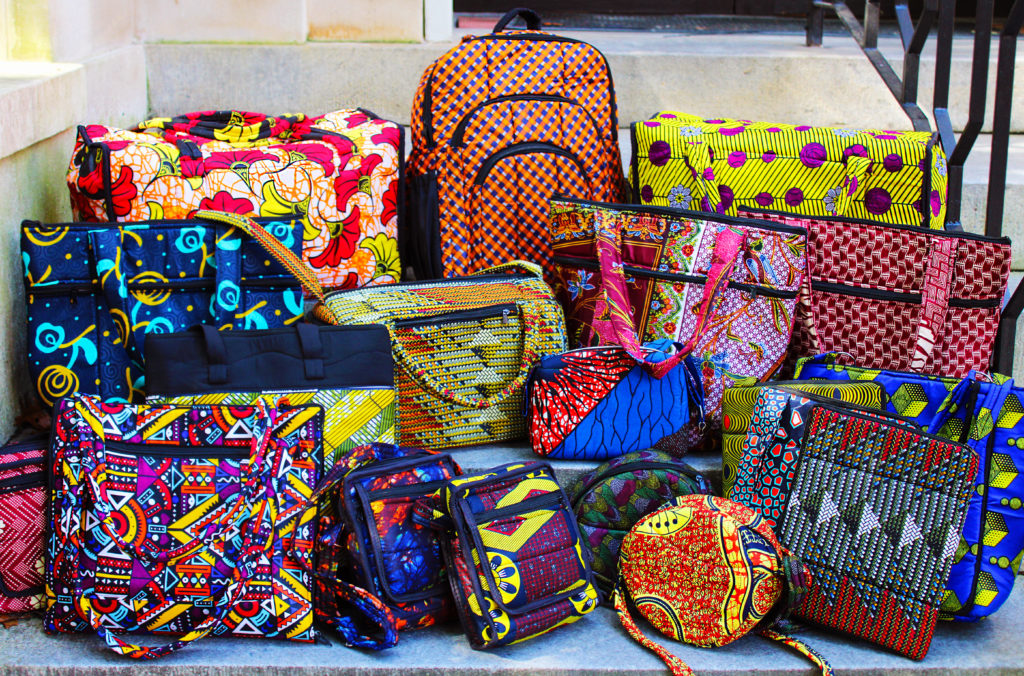
In December, the project won first place in the nonprofit division of the Mercer Innovation Center’s Next Big Idea Competition, for which Drash, Mercer and Thompson also served as presenters. At the SoCon Entrepreneurship Challenge, the team presented to two different sets of judges, providing details on the company, its origins and cause, business plan, financials, and future goals, Dr. Boman said.
“We put lots of hours into this pitch so winning means the world to me,” Mercer said. “The most exciting part about winning this competition is that classes years from now will still be benefiting from this investment. It’s so amazing to see this project grow bigger and bigger. I look forward to seeing how Agaciro’s impact continues to expand.”
“Our team put our all into this competition,” Korta said. “With the prize, we can give so much to the Rwandan women and their families in a sustainable way. When you are passionate about something and others see the value in your passion, it is fulfilling. Seeing the value of Agaciro recognized on such a large scale has only increased our motivation to continue growing this brand. We can’t wait to see the change Agaciro continues to make.”
Agaciro has already proven to be a viable business and exceeded the team’s expectations, Boman said. In six weeks, 87% of the bag inventory had been sold, and more than $2,400 was made in sales, said Drash, who is the project manager.
The items have sold fast and well, with some products like the reusable grocery bag selling out quickly, Dr. Horn said.
“The win means so much to us as a team, to the business school, but the ramifications of this win are so much more far-reaching for the women that it is directly affecting,” Thompson said. “Ten thousand dollars is a significant amount of money to most, but to these women, it’s around 10 years of income. With that notion, this prize money could quite literally change lives. It’s simply amazing what this school is capable of and how many people (this project) can help.”
The next step is to figure out how to most cost-efficiently get more inventory from Rwanda, and the winnings will help to develop the supply chain, digital presence and inventory control process, in addition to making the business and team more professional, Dr. Horn said.
Dr. Boman said the prize money will allow the team to order its biggest shipment of products yet, therefore magnifying the scope of the business. The plan is to order a shipment of about 1,100 new items that will arrive in June, Drash said.
“This (award) money will allow us to order more product from Rwanda, so we can sell it here and we can send more money back to Rwanda to help the families there,” Dr. Boman said. “By bringing the bags here, we can sell them for American prices, which is much more than what they can get for them in Rwanda.”
Money left over after ordering the next shipment will be used for fundraising efforts. The team is hosting a March Madness Carnival from 6-8 p.m. March 24 in the baseball parking lot on the Macon campus, Drash said. Attendees will be able to enjoy food and play games, while NCAA Tournament games play on big screens around them. The entry fee will be $5.

